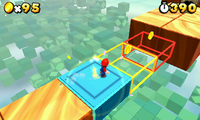Blinking Block
Beat Blocks are a rare type of block found in Super Mario Galaxy 2 and Super Mario 3D Land. As their name implies, Beat Blocks are recognized for alternating between solid blocks and intangible outlines of various colours to the beat of in-game music. Because of this, Beat Blocks function as both platforms that Mario or Luigi safely can stand on when solid, or as deadly pitfalls in their "vanished" state. Depending on the game, both the physical appearance and functions of Beat Blocks differ.
Beat Blocks are first seen in Super Mario Galaxy 2, appearing exclusively in the Beat Block Galaxy. In this appearance, all Beat Blocks are cube-shaped, and alternate between yellow and green. Mario or Luigi must traverse this galaxy, which is made up almost entirely of Beat Blocks, with caution and good timing. The player's Wii Remote will also beep three times before the Beat Blocks alternate. Due to the effects of the Double Time Comet, the Star mission "Silver Stars in Double Time" causes the Beat Blocks to alternate at four times their regular speed (despite the mission's name).

Beat Blocks return in Super Mario 3D Land, appearing in World 6-4, Special 3-5 and Special 7-2 (which is a revise of World 6-4, only with a Cosmic Clone chasing Mario or Luigi). In this appearance, Beat Blocks come in an assortment of shapes, and are now red, yellow and blue. In W6-4 and S7-2, all three colours will appear one-by-one, then vanish in the same manner, leaving periods where all or none of the Beat Blocks will appear solid. However, in S3-5, the blocks alternate between one colour each time.
Beat Blocks return in Super Mario 3D World as they appeared in Super Mario Galaxy 2 in a stage where players must slide down them to reach another area.